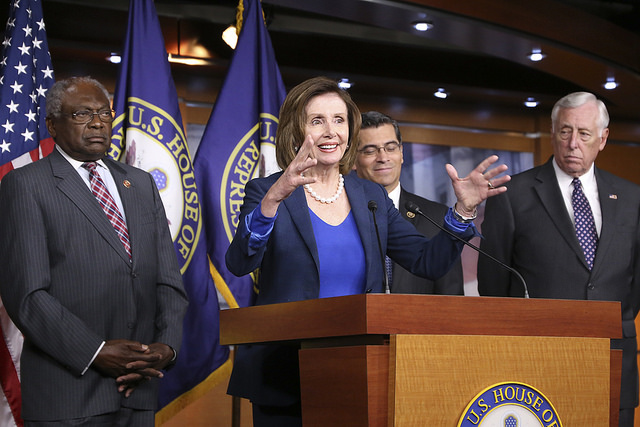
In the first few weeks of the 116th Congress, House Democrats have introduced H.R. 1, a sweeping piece of legislation that will weaponize elections and restrict political speech for all Americans. The legislation is brimming with unconstitutional provisions that would damage our electoral integrity and rewrite longstanding election law for the benefit of the Democrat Party.
The new legislation politicizes and weaponizes the FEC to favor the ruling political party. Under current law, the FEC is a six-member commission, with three Republicans and three Democrats. Four votes are needed to move forward with any prosecution of alleged violations or investigations. This construction ensures that decisions made by the Commission are truly bipartisan and free from any political animus.
H.R. 1 fundamentally changes the construction of the FEC by reducing the number of members from six to five. Advocates of H.R. 1 try to obfuscate this clear politicization by insisting that the new five-person committee must consist of two Republicans, two Democrats, and one “independent” member that is a member of a minor political party.
By this logic, the president could appoint an independent like Bernie Sanders, who is functionally a liberal Democrat, to be the fifth member of the FEC. The new construction rigs the system to ensure total partisan control of the FEC, exactly the opposite of how the Commission is designed under current law.
To make matters worse, H.R. 1 authorizes the president to pick the Chairman of the FEC, all but ensuring total presidential control of the Commission. Under current law, the FEC has a Chair and Vice Chair, and they must be from different parties and selected by the Commission. Not only would H.R. 1 allow the president to pick the Chair, the legislation drastically increases the power the Chair has over the committee.
Essentially, the Chair would function as Chief Administrative Officer over the committee, and would be allowed to act on his own with regard to issuing subpoenas, compelling testimony, and controlling the FEC budget. H.R. 1 also abolishes the requirement that the Vice Chair must be a different party than the Chair, further demonstrating that Democrats want the ruling political party to have ironclad control over a historically bipartisan agency.
H.R. 1 also changes how campaigns are funded. The bill implements a subsidy for politicians in the form of a 600 percent match for small-dollar political contributions. Any individual that donates under $200 to a candidate or PAC is entitled to a 6 to 1 match from the federal government. In effect, this provision would force taxpayers to subsidize political campaigns. This insane 600 percent match of political contributions would be another step towards campaigns funded by theft from taxpayers instead of voluntary political contributions.
Another provision contained in H.R. 1 is new donor identification requirements that would further suppress free speech. According to the new legislation, organizations that make “campaign-related disbursements” totaling more than $10,000 during a two-year period must publicly identify all that gave over $10,000 during the two-year period. The legislation also expands the “stand by your ad” disclaimer in video advertisements, forcing organizations to identify their top five donors at the end of advertisements.
This is obviously an egregious infringement on the First Amendment rights of every American to support causes without fear of intimidation or harassment from those that may disagree. Especially in today’s rancorous political environment, protecting the integrity of donor information is more important than ever.
The bill also creates numerous cases where the ruling political class suppresses political speech. Specifically, the bill creates a new standard for regulating political speech called “PASO.” The PASO standard is an overly-vague standard that asks whether speech “promotes,” “attacks,” “supports,” or “opposes” a candidate or official. If political speech meets the vague PASO standard, the speech can be regulated.
H.R. 1 also undoes the FEC’s “Internet exemption” which excludes the internet from regulation of political speech. Essentially, if the FEC deems that online communication is “paid,” it is subjected to the same regulations and donor disclosure requirements as traditional advertisements. This overbroad and overvague provision would even include content on free platforms like Twitter and Facebook, as the paid definition extends to paid staffers managing the platforms.
Finally, this legislation contains a whole host of bad provisions that would federalize and fundamentally transform how elections are conducted in this country. If the bill was signed into law, the federal government would force the states to implement early voting, automatic voter registration, same-day registration, online voter registration, and no-fault absentee balloting. The bill would also invalidate voter identification laws all over the country by allowing voters to simply sign a statement affirming their identity instead of providing identification.
H.R. 1 also contains language designed to block voter intimidation, which seems reasonable until you realize that it largely duplicates measures already in place all across the country. These systemic changes are a gift to campaign lawyers and their litigious clients, and it comes at the cost of our electoral integrity.
Make no mistake about it – H.R. 1 is a dangerous piece of legislation. If implemented, the bill would suppress political speech, politicize and weaponize the FEC, fund campaigns through theft of taxpayer dollars, and implement numerous reforms that would damage our electoral integrity. This parade of horribles is a clear attempt to grab power by Democrats and to rewrite election law to benefit their cronies and lobbyists. Congress should reject this legislation.

